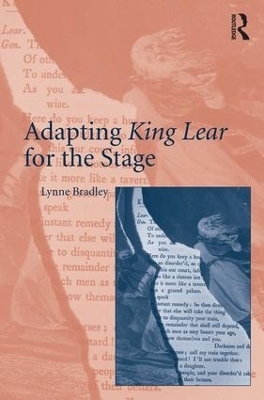
Adapting King Lear for the Stage
Seiten
2010
Routledge (Verlag)
978-1-4094-0597-9 (ISBN)
Routledge (Verlag)
978-1-4094-0597-9 (ISBN)
Questioning whether the impulse to adapt Shakespeare has changed over time, this title argues for restoring a sense of historicity to the study of adaptation.
Questioning whether the impulse to adapt Shakespeare has changed over time, Lynne Bradley argues for restoring a sense of historicity to the study of adaptation. Bradley compares Nahum Tate's History of King Lear (1681), adaptations by David Garrick in the mid-eighteenth century, and nineteenth-century Shakespeare burlesques to twentieth-century theatrical rewritings of King Lear, and suggests latter-day adaptations should be viewed as a unique genre that allows playwrights to express modern subject positions with regard to their literary heritage while also participating in broader debates about art and society. In identifying and relocating different adaptive gestures within this historical framework, Bradley explores the link between the critical and the creative in the history of Shakespearean adaptation. Focusing on works such as Gordon Bottomley's King Lear's Wife (1913), Edward Bond's Lear (1971), Howard Barker's Seven Lears (1989), and the Women's Theatre Group's Lear's Daughters (1987), Bradley theorizes that modern rewritings of Shakespeare constitute a new type of textual interaction based on a simultaneous double-gesture of collaboration and rejection. She suggests that this new interaction provides constituent groups, such as the feminist collective who wrote Lear's Daughters, a strategy to acknowledge their debt to Shakespeare while writing against the traditional and negative representations of femininity they see reflected in his plays.
Questioning whether the impulse to adapt Shakespeare has changed over time, Lynne Bradley argues for restoring a sense of historicity to the study of adaptation. Bradley compares Nahum Tate's History of King Lear (1681), adaptations by David Garrick in the mid-eighteenth century, and nineteenth-century Shakespeare burlesques to twentieth-century theatrical rewritings of King Lear, and suggests latter-day adaptations should be viewed as a unique genre that allows playwrights to express modern subject positions with regard to their literary heritage while also participating in broader debates about art and society. In identifying and relocating different adaptive gestures within this historical framework, Bradley explores the link between the critical and the creative in the history of Shakespearean adaptation. Focusing on works such as Gordon Bottomley's King Lear's Wife (1913), Edward Bond's Lear (1971), Howard Barker's Seven Lears (1989), and the Women's Theatre Group's Lear's Daughters (1987), Bradley theorizes that modern rewritings of Shakespeare constitute a new type of textual interaction based on a simultaneous double-gesture of collaboration and rejection. She suggests that this new interaction provides constituent groups, such as the feminist collective who wrote Lear's Daughters, a strategy to acknowledge their debt to Shakespeare while writing against the traditional and negative representations of femininity they see reflected in his plays.
Lynne Bradley received her PhD from the University of Victoria, Canada. She works as an independent researcher in Toronto.
Contents: Introduction; 'Why this is not Lear': adaptations before the 20th century; 'Other accents borrow': Bottomley, Baring, and a new approach to adaptation; 'Only we shall retain the name': Bond's Lear and Barker's Seven Lears; 'Re-vision' of the kingdom: feminist adaptations of King Lear; Conclusion: 'The promised end'?; Bibliography; Index.
| Verlagsort | London |
|---|---|
| Sprache | englisch |
| Maße | 156 x 234 mm |
| Gewicht | 453 g |
| Themenwelt | Literatur ► Lyrik / Dramatik ► Dramatik / Theater |
| Kunst / Musik / Theater ► Theater / Ballett | |
| Geisteswissenschaften ► Sprach- / Literaturwissenschaft ► Anglistik / Amerikanistik | |
| Geisteswissenschaften ► Sprach- / Literaturwissenschaft ► Literaturwissenschaft | |
| ISBN-10 | 1-4094-0597-4 / 1409405974 |
| ISBN-13 | 978-1-4094-0597-9 / 9781409405979 |
| Zustand | Neuware |
| Haben Sie eine Frage zum Produkt? |
Mehr entdecken
aus dem Bereich
aus dem Bereich
Der Tragödie erster und zweiter Teil. Urfaust
Buch | Hardcover (2021)
C.H.Beck (Verlag)
CHF 15,90


